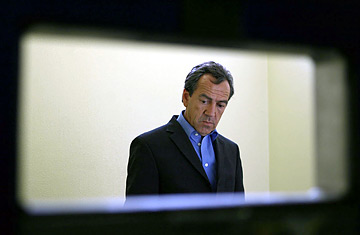
British actor Robert Lindsay as Tony Blair in the television drama The Trial of Tony Blair
The year is 2010. Hillary Clinton is in the White House and planning her re-election on a tread-softly foreign policy platform after the debacle of the U.S. attack on Iran's nuke facilities launched in the last throes of President Bush's Administration. Bush himself, holed up on his ranch since 2008, is losing his battle with the bottle. Across the pond, having prolonged his departure from 10 Downing Street to within a few weeks of a general election, Blair resigns and ponders his next role. But on the sidelines, an unlikely campaign to bring the former PM before an international criminal tribunal for "aggression in Iraq" is making unexpected headway.
From Blair's first appearance in the film (confessing his "mortal sins" to a Catholic priest) it's clear that his "trial" is neither balanced nor fair. The case for the prosecution is the only one made, the verdict is known at the start and the play ends with Blair being hustled into a paddy-wagon and dispatched to The Hague.
As a vicious satire and a vicarious act perpetrated by the writer Alister Beaton on behalf of Channel 4 and millions of disaffected British voters, the film constructs its own sense of justice. More to the point, it's also cruel and very funny.
Playing Blair for the second time after his performance in the 2005 Beaton play A Very Social Secretary, about the decline and fall of Home Secretary David Blunkett, actor Robert Lindsay is spot on with the PM's speech patterns, mannerisms and tics. Lindsay visibly swells when an aide advises Blair to shun the press after his resignation, telling Blair "You're Olympian." But while waiting for the U.N. to call and offer him "something big" or for Bono to get in touch, Blair sits around toying with the idea of setting up the "Blair Foundation for International Peace and Justice and Interfaith Understanding ... or something like that," or dictating the closing chapters of his autobiography, in which he mentions "the hand of history on my shoulder" 29 times.
The satirical knives come thick and fast: Blair's shock at the squalor of the state-run hospital he has to attend when he gets sick; the steely disdain of the PM's wife Cherie (played by Phoebe Nicholl) for the Browns, who are moving into No. 10 Downing; the alacrity with which the U.S. drops Blair by agreeing to a U.N resolution to set up a special tribunal for aggressors in Iraq in order to prove its new enlightened foreign policy credentials. "We're going to say some unpleasant things about you," the U.S. ambassador in London tells Blair. "But we don't really mean them."
That's when the darker dramatics start to seep in. Blair suddenly goes all Lady Macbeth, washing his hands obsessively, having psychotic visions of a Union Jack-draped coffin on the kitchen table, a knife-wielding Arab assassin, a dead Iraqi child. Instead of enjoying the simple pleasure of skewering a politician, we're suddenly asked to sympathize with a man whose honest intentions have been cruelly scuppered by fate and faithless friends.
Once that satirical spell is broken, reality rushes in. Blair may have a lot of unsavory adjectives hurled at him on a daily basis, but for better or worse, he got the nickname Teflon Tony on account of his acute antenna for self-preservation. The idea that the former Prime Minister, or his lawyers, could be so blindsided by the potential threat of international legal prosecution, is just preposterous. Well, at least, it is for now.
